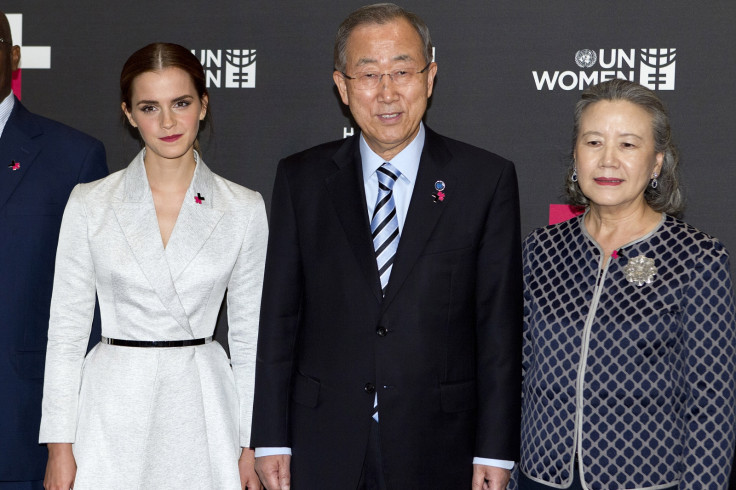As a Feminist, Emma Watson's UN HeForShe Speech Makes me Uncomfortable

The dust is only just beginning to settle on Emma Watson's divisive speech at the United Nations last week and already I'm incredibly bored of everyone's two cents on the matter.
There were three categories of response: the student activists who called her address 'groundbreaking'; the Not-All-Men men who were concerned that she didn't focus on fighting for male equality too; and then there were those less concerned with the content of Watson's speech than the fancy white thing she was wearing.
Watson has had a lot of backlash, unsurprisingly – popular figures are easy targets because most of the time you can mouth off about them without them ever really finding out and telling you off, and an awful lot of men (and women) seem to want her to shut up and look pretty.
Similarly, it is easy to attack any ambassador of women's rights based on their background – and, while it is unfortunate that Ms Watson's route to the UN has been wrought with luck, wealth, and top universities, these circumstances should not be used as a rod to beat her with.
She's using her fame as a platform to promote equality - in theory.
Capitalising on Celebrity
It's not the first time a celebrity has launched women's rights into popular culture – most recently Lena Dunham, Caitlin Moran, and even Beyonce have proudly proclaimed themselves feminists – but rarely has the discussion held such a captive audience.
This might seem indicative of a wider interest in feminism but to me, it feels like armchair activism.
It's easier to watch the Harry Potter actress speak for five minutes on YouTube than it is to travel to the 2014 Femi-Fest to listen to Rachel Moran speak about her experiences as a prostitution survivor.
Not only that – Emma Watson's softly-softly, beseeching approach to women's rights, which is address to and focused on men, is a lot more palatable to most than the idea of actually overthrowing the patriarchy.
HeforShe (arguably the worst campaign name in history) is an uncomfortable concept to me because according to Watson, men have a vested interested in feminism because it affects them too.
Never mind issues like domestic abuse figures being at an all-time high, sexual assaults on public transport rising by over 20% in one year, and don't even get me started on the gender pay gap – women's rights are suddenly interesting because gender inequality hurts men too.
I'm sure it does – no specific examples of men suffering PTSD due to an inability to express their sensitivity come to mind – but that isn't the point.
Why HeForShe Makes Me Uncomfortable
The point is this: in an ideal world, the fact that women are suffering would be enough for everyone to join forces to end it.
However this isn't an ideal world and it's testament to our selfishness as a nation that we're only interested in other people's problems when they become our own.
We're all a bit guilty of it – we only start caring about climate change when it's suggested that it might affect us.
The intentions of HeForShe are undoubtedly honourable, but women do not want to be seen as an endangered species – we want to be seen as equal, as a force to be reckoned with and respected.
I'm also uncomfortable with HeForShe because, despite all their good intentions, male feminist supporters must realise that their acting as spokespeople on behalf of women's rights can often do more harm than good.
Patrick Stewart and Joss Whedon are great examples – both have been lifelong supporters of women's rights and their campaigning for equality is constantly lauded, but when women speak out on the subject of their own rights, they are more often than not met disdain – not least by the online community.
Of course we want men to support feminism, but we must notice and address the problem that many people are more willing to listen to a man speak on the subject of women's rights than a woman, and that in itself is hugely damaging.
Feminism has had its claws blunted for the sake of appearing friendly to its oppressors. It's not about applauding people for being unselfish - feminism is a fight, and not a fun one. It's all well and good men saying they support the cause but what are they actually doing about it?
Sadly, attitudes towards women do not change with the click of a button – hashtagging your tweets with #HeforShe does not remove thousands of years of sexual oppression and violence.
It's all very well saying you support the cause, but what are you actually doing about it?
I hope, instead, that every male who congratulates himself for 'backing the campaign' with a smug Instagram snap and a white placard, will actually look at his behaviour and the behaviour of others towards women, and realise how much work he actually has to do.
If gender equality is to become a universal achievement, we need to raise the bar a lot higher.
Lily Rae is a writer and musician. Follow her on Twitter at @ohnolilyrae
© Copyright IBTimes 2025. All rights reserved.





















